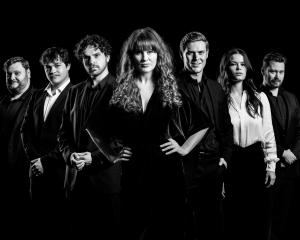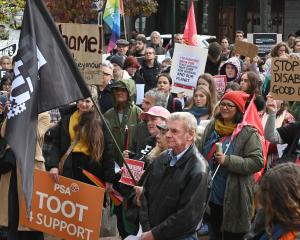
The answers to these and a host of other interesting questions are meat and drink for professors Jeff and Lisa Smith, a couple now happily living in Dunedin and working at the University of Otago after 18 years heading the office of research and evaluation at the huge Metropolitan Museum of Art in New York.
The Smiths have held down university positions for more than 20 years, as well as working together as advisers for "the Met" and more than 30 other museums.
Much of their work involved helping institutions attract more people by making visitor experiences more comfortable and meaningful.
That ranged from studying the optimum height and optimum print size for information labels to ensuring visitors could navigate their way through multi-roomed institutions.
Attendance was not a problem for the Metropolitan, which stretched several city blocks, had 2000 staff, 19 different exhibition halls, took several days to explore fully and attracted more than five million visitors annually, they said.
But institutions everywhere wanted to know how to satisfy one-time visitors, as well as catering for repeat visitors and engaging the younger generation.
They designed visitor surveys and carried out their own observations to discover what kept people visiting museums and how they learnt through their visits.
For example, while visitors at the Metropolitan often said they spent five minutes or more looking at a masterpiece painting, the truth was more revealing, Prof Jeff Smith said.
"The average was 27 seconds per painting and the [time] for the typical person was 17 seconds. No-one spent five minutes. There is too much to see, too much of a press to go on . . . and not miss anything."
Their research also showed viewing significant artworks or objects had a quantifiable personal impact on visitors, the Smiths said.
Surveys conducted at three museums showed visitors were inspired about what they had seen, which in turn challenged them to think more deeply about their own goals in life.
The Smith said they hoped to continue exploring that research in New Zealand.
"It is the idea that museums have a civilising effect and have power in terms of transmitting culture and promoting good societal effects," Prof Lisa Smith said.
So what prompted the couple to leave it all behind and emigrate to New Zealand? They simply wanted a change of scenery and New Zealand appealed.
"Our children [they have three from previous relationships] were grown up and we thought if we were going to go on a big adventure we had better do it soon," Prof Jeff Smith said.
After two years in the North Island they found jobs at the University of Otago's Dunedin College of Education in 2005.
Both have since been promoted.
Prof Jeff Smith is co-director of the national education monitoring programme, which evaluates children's learning at years four and eight, while Prof Lisa Smith is in charge of research and professional development at the college.
They plan on staying and are preparing to build a house at Heyward Point, above Aramoana.
They enthuse about Dunedin, saying things long-term residents take for granted like green grass, sea and harbour views, and cows grazing beside the Dunedin International Airport runway, are major drawcards after the hustle and bustle of New York.
"Every time we land at the airport and look out at the cows, we know we are home," Prof Jeff Smith said.
"We're always glad to be home and by home we mean Dunedin, not New Zealand," adds his wife.
They are also enthusiastic about New Zealand's cultural offerings, praising the many museums, exhibitions, art galleries and performances they have visited in their time here.
Everything from the "outstanding" Otago Museum and Te Papa, through unexpected treasures in regional towns like the John Money art collection at the Eastern Southland Gallery in Gore and the tiny Ranfurly and Waikouaiti museums, to memorable live performances at the Fortune and Globe Theatres.
The couple may just be Dunedin's top promoters, successfully enticing many "museum friends" from all over the world to visit.
"We say we're running Smith's B and B (bed and breakfast)," Prof Lisa Smith said.
Advertisement













